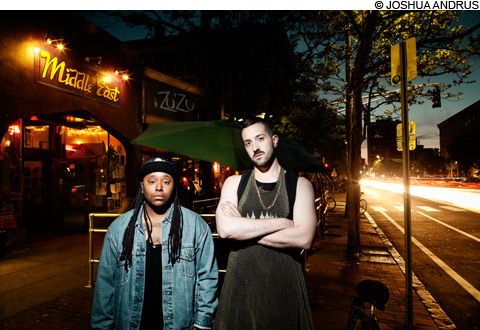
NEW QUEER LIFE DJs D'hana (Perry, left) and Rizzla (Brian Friedberg) spin songs into community. |
Growing up gay on Long Island, Brian Friedberg went out dancing almost every night: at all-ages clubs, raves, dancehall nights, gay hip-hop nights, gay clubs, straight clubs, and late-night joints. But he couldn't find the party he was looking for.
"The term 'queer party' didn't exist back then," he said. "It was just 'gay night.' There wasn't an acknowledgment of diversity within homosexual peoples." So when he moved to Hartford after college and started DJing, he aimed to change that. He billed his first official club booking as a "bi-party."
"It was kind of tongue-in-cheek," he said. "I meant it was for people of multiple sexual orientations." And it worked — the party drew a bunch of different people from each letter in the LGBTQ umbrella. These days, Friedberg is still at it. DJing under the name Rizzla, he makes up half the entertainment at Nu Life, a "post-queer dance party," part of a growing urban dance scene that aims for cross-sexuality and cross-gender inclusion.
"I don't go to gay nights anymore," Friedberg said. "I don't want to go to single-gender parties, and I don't want to go to dual-gender parties. I want to go to multiple-gender parties, to be able to look around the room and see at least three, four, five genders."
"Queer" describes more than the people who make up the scene — it's also an aesthetic. "It's about music and culture and art," said D'hana Perry, Friedberg's DJ partner, who identifies as genderqueer. "We found ourselves wanting to create a space that isn't separatist, that goes beyond male or female or gay or lesbian, something different altogether. We wanted something that was organically multicultural, something that was organically political, organically artistic, that had more of an aggressive edge than all the other queer stuff going on."
For the past three years, D'hana and Rizzla have packed ZuZu on Tuesdays and won plaudits in big-deal publications like Fader. Next month, Nu Life will leave ZuZu for other spaces both local and national, and become a freefloating dance night with a heavier art component.
"We want to go out while we're on top," Friedberg said.
BUILDING A SPACE
Friedberg and Perry met three years ago at the old Milky Way in Jamaica Plain while DJing a now-defunct party called Kiki. They quickly discovered a shared affection for global beats and radical politics. They decided to start DJing together that very night.
"We wanted to build a space for queer people like us," Perry, 34, explained. "We don't live in a bubble. I think it's important that you don't have culture shock when you leave Jamaica Plain or Cambridge."
As an identity, "queer" can be used as an LGBTQ umbrella term, and can also connote "radical politics and alternative culture and that kind of thing," said Perry. "But that was starting to feel almost constraining — it didn't quite fit for us, either . . . there was something missing."